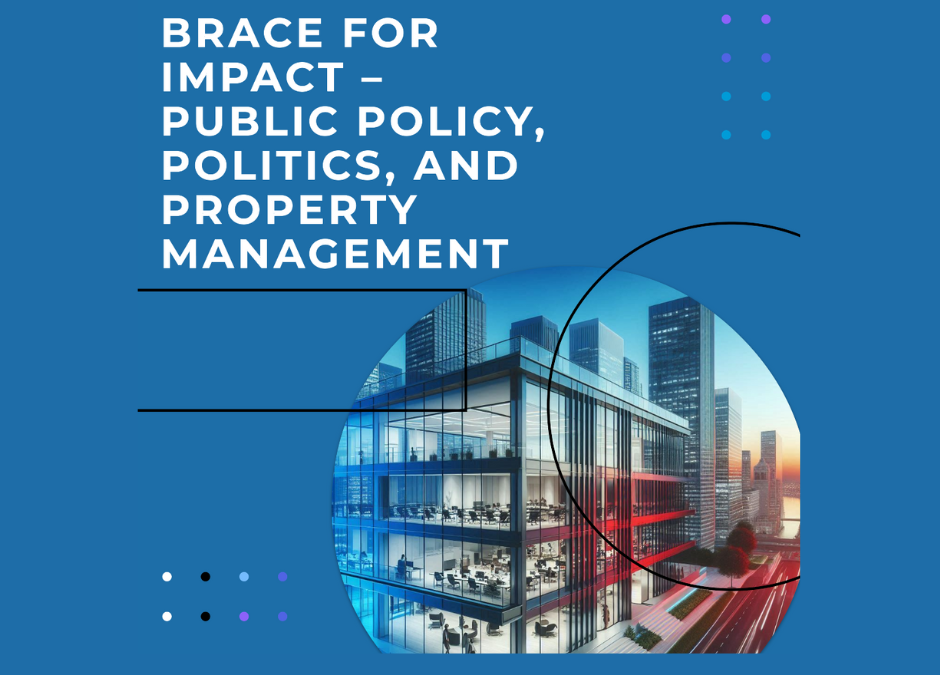Brace for Impact – Public Policy, Politics, and Property Management
It’s an understatement to say that the world of Commercial Real Estate and Property Management is and will continue to face extreme challenges under the current market conditions and climate. Much of this privation can be directly and indirectly tied to public policy and politics, which obstruct and complicate an already challenging industry to navigate and manage effectively. Resourceful, adaptive, and preemptive strategies are required to navigate and prevail in these choppy circumstances, but it can be done!
More and more buildings are reverting into the hands of their lenders. Struggling occupancy and rent rates are starving buildings into receivership or short sales. Current interest rates and loan requirements make it difficult for the economy to pencil, refinance, or to obtain necessary capital to make improvements to attract and retain tenants. Increased homelessness and the impact of the “Colorado Right to Rest Act” are creating operational challenges with increased crime, building security, vandalism, and degradation of downtown and urban markets to the point of intimidating businesses away from leasing in these areas and creating further distressed, unsafe scenarios for management companies to face and overcome daily. On-going labor and supply chain shortages delay critical services and property improvements that come with an inflated price tag and fractured quality in services and deliverables that require intense oversight and management to ensure quality. Changes to tax laws such as Senate Bill SB24-22 and the repeal of the Gallagher Amendment in 2020, which ultimately increase taxes immediately and in the future on already distressed and struggling assets, will continue indefinitely into the future and create a bumpy road ahead. Followed by upcoming energy policies that focus on retrofitting commercial HVAC systems from gas to electric to comply with new clean energy laws, which sound encouraging at the surface level but come with idealistic (an unattainable, depending on who you talk to) and expensive conversion costs that will very likely underperform on all levels regardless of which side of pollical party lines you align with. Each one of these impediments is overwhelming on its own but is further complicated by the other compounding obstacles woven into this divisive political and economic climate we find ourselves in.
Does anyone know a highly skilled, qualified, and available Property Manager with amazing people and communication skills, an understanding of basic accounting, good common sense, and problem-solving skills who would like to unapologetically take on these challenges for an average annual salary of $75,657 (thank you Indeed.com) to take pristine care of cherished real estate assets? No? And there surfaces another obstacle we are facing as an industry. We are basically handing special needs buildings in critical condition over to underqualified, under-trained staff, or we are overextending and burning out our seasoned managers, hoping for barely acceptable outcomes at best.
Admittedly, some days, it is hard not to feel overwhelmed and defeated by all the constraints and red tape we face. However, one admirable aspect of this industry is its resilience and adaptability. This resilience, this ability to bounce back, is what keeps us going. However, that doesn’t mean the challenges ahead will be easy to unravel. So, what are some possible next steps to overcome these complications?
First and foremost, get involved in ground-level politics. That’s where true understanding and change can develop, grow, and become the sincere foundation to build public policy and laws that are truly within the community’s best interest and reflect the majority’s resolve. Complacency is the cancer that blocks understanding and growth in our society. Public policy has a reputation for re-packaging its agenda-driven initiatives to appear innocent and noble but can come with some arguably poor consequences and results. For example, the recent tax initiatives may have led some to believe that they will reduce taxes, and they did to start. However, while they may reduce taxes in some capacity in the beginning, they eventually eliminate the check-and-balances from previous laws and policies and will likely result in an increase in taxes without caps in place to keep cost control measures in place, resulting in uncontrollable taxation in the future.
The recent new clean energy laws intended to convert natural gas HVAC systems over to electric have a well-intended premise that most would support. However, the practical and feasible implementation of these laws could fall short, leaving everyone frustrated due to the lack of successful execution of much-needed environmental change with much higher conversation and operational costs to building owners, resulting in very little value added to either party. There is a sincere question if there is or could be enough required infrastructure in our power systems available to support converting the current natural gas HVAC systems to electric ones. If the infrastructure is not available to support these clean energy laws, why were they put in motion if they cannot truly be executed with success? If these good, in theory, but unrealistic changes are not feasible, one could argue they are half-baked, have no seat at the table, have made it into law prematurely, and should be repealed to make room for more effective policies. It is important that everyone works at the ground level to ensure that the policies and laws put into action reflect the majority, can be implemented successfully, and are not a waste of time and resources. This requires everyone to become involved and educated – no excuses!
Other measures that can be taken to “brace for impact” are to tighten up your capital planning efforts. Make sure your Owners know what they need to be planning for now and ten-plus years from now to minimize surprises and capital calls. Take a very detailed and proactive management position by planning and staying ahead of what inevitably will need to be tended to. Use technology and outsourcing to relieve your experienced staff from routine, mundane compliance tasks so they can focus on building strong relationships, implementing business strategy, managing high-value / high-risk projects, and training new staff members so they can step into stronger roles with confidence and success. Finally, don’t be afraid to end relationships with accounts and assignments that don’t align with your business model, strategy or core values. This is your power, your control over your business’s direction. The wrong fit can prove to be costly in dollars and reputation.
In conclusion, the commercial real estate and property management sector is at a pivotal juncture, faced with political, economic, and operational hurdles. Yet, despite these daunting challenges, there is a resilient spirit within the industry. By engaging in proactive political advocacy, meticulous capital planning, strategic use of technology, and assertive business management, the path forward is not easy. Through this adaptive and forward-thinking approach, the industry can not only withstand the current turbulence but also emerge stronger, ready to thrive in a future defined by resilience and innovation.
By: Meghan Pritt, COO, Sessions Group, LLC




Recent Comments